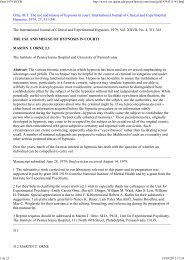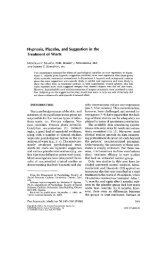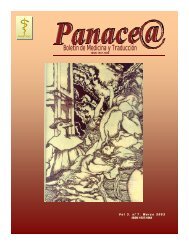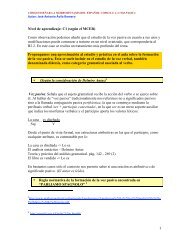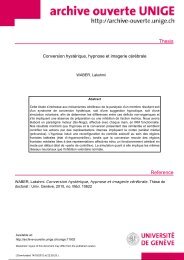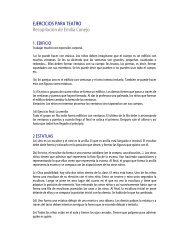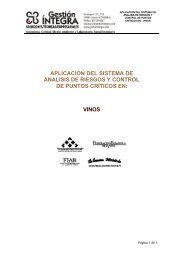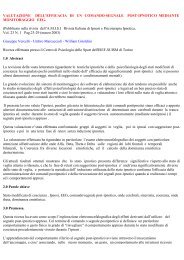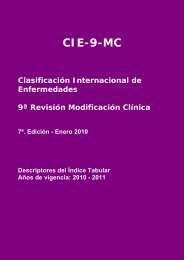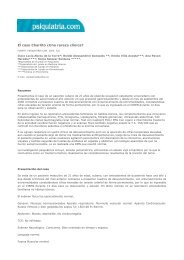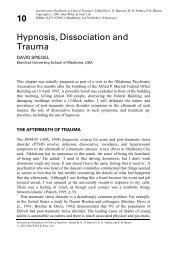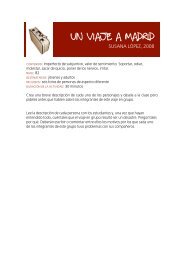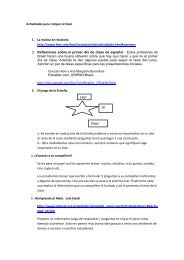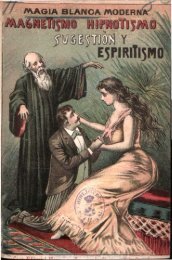Diccionario etimológico comparado de la lengua castellana
Diccionario etimológico comparado de la lengua castellana
Diccionario etimológico comparado de la lengua castellana
You also want an ePaper? Increase the reach of your titles
YUMPU automatically turns print PDFs into web optimized ePapers that Google loves.
I<br />
FLAME FLAND 9219<br />
F<strong>la</strong>men-co, ca. adj.<br />
l^TIM.— Del antiguo hol. V<strong>la</strong>en<strong>de</strong>re<br />
(=hol. V<strong>la</strong>an<strong>de</strong>ren), al que correspon<strong>de</strong>n:<br />
dan. y sueco F<strong>la</strong>n<strong>de</strong>rn; med. <strong>la</strong>t.<br />
F<strong>la</strong>ndria, FLandrica; port. F<strong>la</strong>ndres;<br />
esp. F<strong>la</strong>n<strong>de</strong>s (cfr.), <strong>de</strong>scien<strong>de</strong>n: hol.<br />
v<strong>la</strong>eming ; bajo-al. v<strong>la</strong>mink ; an. al. al.<br />
f<strong>la</strong>ming; al. J<strong>la</strong>ming; med. <strong>la</strong>t. f<strong>la</strong>mingus;<br />
\iOv{. f<strong>la</strong>mengo ; francés J<strong>la</strong>mand<br />
esp. FLAMENCO. Deiívase V<strong>la</strong>en<strong>de</strong>re =<br />
V<strong>la</strong>an<strong>de</strong>ren <strong>de</strong> ver-ne<strong>de</strong>r-en bajar, ser<br />
bajo; cannibiado en *cre-n<strong>de</strong>ren y luego<br />
en V<strong>la</strong>en<strong>de</strong>ren^ por nnetátesis <strong>de</strong> <strong>la</strong> -/•<strong>de</strong><br />
ver- y cambio <strong>de</strong> -r- en -/-, siguiendo<br />
<strong>la</strong>s leyes <strong>de</strong> <strong>la</strong> fonología. Compónese<br />
ver-ne<strong>de</strong>r-en <strong>de</strong>l pref. ver-^ intensivo;<br />
correspondiente al medio al. al. ver-;<br />
ant. al. al. fir (=far-J; gót. fair^ fra-,<br />
faur-, etc., cuya etim. cfr. en peri-; y<br />
ne<strong>de</strong>r-en, bajar, ser bajo; el cual se <strong>de</strong>riva<br />
<strong>de</strong>l adj. ne<strong>de</strong>r, bajo; corres|)ondiente<br />
al al. nte<strong>de</strong>r, bajo, inferior; m. al.<br />
al. ni<strong>de</strong>r; ant. al. al. nidar ; anglo-saj.<br />
nid'er; ingl. netlier ; ant. nórd. nidhr<br />
skt. pTrTTTT) ni-tarám, (comparativo <strong>de</strong><br />
f^-, Al?, cuya etim. cfr. en iN=grg. tv,<br />
elv, e-ví; formado por medio <strong>de</strong>l suf.<br />
-TARA, cfr. DE-TER-I0R, y NEU-TRo); ant.<br />
al. al. ni-dari; m. al. al. ni<strong>de</strong>r, ni<strong>de</strong>re;<br />
anglo-saj. nithiri; med. inglés nethere,<br />
etc. Etimológ. V<strong>la</strong>en<strong>de</strong>ren=F<strong>la</strong>n<strong>de</strong>s<br />
significa muy bajo. Díjose así por ser<br />
una región baja y húmeda. Del mismo<br />
adj. ne<strong>de</strong>r formóse Ne<strong>de</strong>r <strong>la</strong>ndt, F<strong>la</strong>n<strong>de</strong>s,<br />
Países Bajos; alem. nie<strong>de</strong>r-<strong>la</strong>nd, región<br />
baja; Nie<strong>de</strong>r-<strong>la</strong>n<strong>de</strong>., los Países Bajos,<br />
(para <strong>la</strong> etim. <strong>de</strong> -<strong>la</strong>nd cfr. <strong>la</strong>nd-grave);<br />
primit. <strong>de</strong> neer<strong>la</strong>nd-és. Cfr. F<strong>la</strong>n<strong>de</strong>s,<br />
ex-ter-ior, etc.<br />
SIGN.— 1. Natural <strong>de</strong> <strong>la</strong> antigua región ó<br />
<strong>de</strong> <strong>la</strong>s mo<strong>de</strong>rnas provincias l<strong>la</strong>madas F<strong>la</strong>n<strong>de</strong>s.<br />
Ú. t. c. s.<br />
2. Perteneciente á el<strong>la</strong>s.<br />
3. m. Idioma f<strong>la</strong>menco.<br />
P<strong>la</strong>menqu-il<strong>la</strong>. f.<br />
Cfr. etim. f<strong>la</strong>menco, 2°. Suf. -il<strong>la</strong>.<br />
SIGN.— 1. P<strong>la</strong>to mediano, <strong>de</strong> figura redonda<br />
ü oblonga, mayor que el trinchero y menor<br />
que <strong>la</strong> fuente<br />
:<br />
De un trinchero rt una f<strong>la</strong>menquil<strong>la</strong> ordinaria, sin<br />
comunicarlo con el fuego, sacasse una salvil<strong>la</strong> extremada.<br />
Hort. Mar. f. 233<br />
2. MARAVILLA, 3.* BCep.<br />
Flám-eo. m.<br />
Cfr. etim. f<strong>la</strong>ma. Suf. -eo.<br />
SIGN.—Velo ó toca <strong>de</strong> color <strong>de</strong> fuego que<br />
en <strong>la</strong> Roma antigua se ponía á <strong>la</strong>s <strong>de</strong>sposadas.<br />
;<br />
P<strong>la</strong>m-ero. ni.<br />
Cfr. etim. f<strong>la</strong>ma. Suf. -ero.<br />
SIGN.— Can<strong>de</strong><strong>la</strong>bro que, por medio <strong>de</strong> mixtos<br />
contenidos en él, arroja una gran l<strong>la</strong>ma.<br />
F<strong>la</strong>mí-ger-o, a. adj.<br />
Cfr. etim. f<strong>la</strong>ma y ger-ente.<br />
SIGN.— poét. Que arroja ó <strong>de</strong>spi<strong>de</strong> l<strong>la</strong>mas:<br />
Viendo <strong>la</strong> luz en su región opaca, La f<strong>la</strong>mígera voz<br />
<strong>de</strong>l pecho saca. Vill. Fab. Phaet. Oct. 175.<br />
Flám-u<strong>la</strong>. f.<br />
Cfr. etim. f<strong>la</strong>ma. Suf. -ida.<br />
SIGN.— 1. Especie <strong>de</strong> grímpo<strong>la</strong> :<br />
Que con ve<strong>la</strong>s y flámu<strong>la</strong>s tendidas, Despreciaban el<br />
golfo <strong>de</strong> Nereo. Lop. Cir. f. 6.<br />
2. ant. Ranúnculo ó apio <strong>de</strong> ranas.<br />
F<strong>la</strong>n. m.<br />
ETIM.— Del [)rimit. f<strong>la</strong>ón (cfr.), que<br />
correspon<strong>de</strong> á <strong>la</strong>s formas siguientes<br />
ital. fiadone; prov. J<strong>la</strong>uzon; franc. ant.<br />
J<strong>la</strong>on; mod f<strong>la</strong>n; ingl. f<strong>la</strong>wn; ant. al.<br />
al. f<strong>la</strong>do^ f<strong>la</strong>da; m. al. al. v<strong>la</strong><strong>de</strong>, chato,<br />
p<strong>la</strong>no, ap<strong>la</strong>stado; hol. v<strong>la</strong><strong>de</strong>; al. f<strong>la</strong><strong>de</strong>n;<br />
ha']o-\ñl. f<strong>la</strong>to, f<strong>la</strong>uto,f<strong>la</strong>udo, etc. Todas<br />
estas pa<strong>la</strong>bras tienen por base <strong>la</strong> raíz<br />
FLAT- achatar, ap<strong>la</strong>nar; correspondiente<br />
á <strong>la</strong> indo-europea prat-, exten<strong>de</strong>rse,<br />
ap<strong>la</strong>narse, ser chato, p<strong>la</strong>no; cuya aplicación<br />
cfr. en a-chat-ar y chato. Etimológicamente<br />
f<strong>la</strong>ón = FLAN significa<br />
torta <strong>de</strong> forma chata, p<strong>la</strong>na, achatada.<br />
Cfr. CHATO, PLATO, etc<br />
SIGN.— P<strong>la</strong>to <strong>de</strong> dulce, que se hace mezc<strong>la</strong>ndo<br />
yemas <strong>de</strong> huevo, leche y azúcar, y<br />
poniendo este compuesto, para que se cuaje,<br />
en el baño <strong>de</strong> maria <strong>de</strong>ntro <strong>de</strong> un mol<strong>de</strong> generalmente<br />
bañado <strong>de</strong> azúcar tostada. Suele<br />
componerse también <strong>de</strong> harina, y con frecuencia<br />
se le echa alguna otra cosa, como café, naran-<br />
ja, vainil<strong>la</strong>, etc.<br />
F<strong>la</strong>nco, ni.<br />
Cfr. etim. f<strong>la</strong>nqu-ear.<br />
SIGN.— 1. Cada una <strong>de</strong> <strong>la</strong>s dos partes <strong>la</strong>terales<br />
<strong>de</strong> un cuerpo consi<strong>de</strong>rado <strong>de</strong> frente. El<br />
FLANCO <strong>de</strong>recho; por el f<strong>la</strong>nco izquierdo :<br />
No estando <strong>la</strong> vanguardia mas fortificada que los<br />
f<strong>la</strong>ncos ni los f<strong>la</strong>ncos que <strong>la</strong> retaguardia. Iban. Tr. Q.<br />
Cnr. 1. 4, c. 13.<br />
2. Costado, <strong>la</strong>do <strong>de</strong> un buque ó <strong>de</strong> un cuerpo<br />
<strong>de</strong> tropa: como <strong>de</strong> navio, <strong>de</strong> batallón, escuadrón,<br />
columna, etc.<br />
3. For. Parte <strong>de</strong>l baluarte que hace ángulo<br />
entrante con <strong>la</strong> cortina, y saliente con <strong>la</strong><br />
frente.<br />
4. *nEL ESCUDO. B<strong>la</strong>s. Lado <strong>de</strong>l escudo, que<br />
en su longitud correspon<strong>de</strong> al corazón, y en<br />
su <strong>la</strong>titud ocupa <strong>la</strong> tercera parte.<br />
5. *RETiRADO. Fort. El <strong>de</strong>l baluarte cuando<br />
está cubierto con el orejón.<br />
F<strong>la</strong>n<strong>de</strong>s. n. p.<br />
Cfr. etim. f<strong>la</strong>menco, 2°.<br />
Fr. ¡I i?6'//'. — ¿ESTAMOS AQUÍ, Ó EN FLANDES?<br />
expr. faro, ¿estamos aquí, ó en jauja?<br />
:



